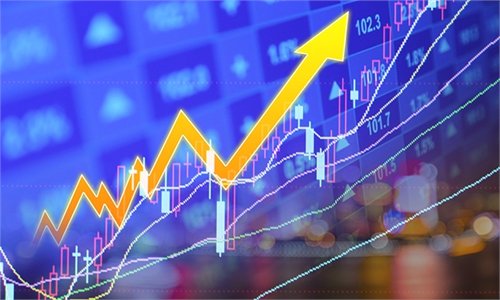
Illustration: Chen Xia/Global Times
The long-anticipated rally of Chinese stock markets has arrived, thanks to the country's top decision-making body's firm pledge to ratchet up economic stimulus in order to achieve the pre-set yearly growth rate of around 5 percent, while at the same time accelerating investment in technology to enhance the country's industrial competitiveness among the world's major economies.On Friday, the stock indexes continued to bounce back with the benchmark Shanghai Composite Index surging 1.84 percent to close at 3,275.93 points. The same index rose 2.13 percent on Tuesday. Gross gains for the index last week totaled 107 points or 3.5 percent. Gains on Hong Kong's Hang Seng index soared more than 4.2 percent last week, led by Chinese mainland technology companies and advanced electric carmakers.
The rally of Chinese equities is expected to endure and even gain pace over the coming weeks as investors' enthusiasm is ignited up by a new package of growth-enhancing policies from the government. Although China's April-June economic growth of 6.3 percent was somehow beneath expectations, the rate is one of the highest among the world's major economies.
To shore up public confidence in Chinese economy's resilience, the powerful Political Bureau of the Communist Party of China Central Committee convened an important meeting last week, deciding to ramp up stimulus support in the second half of the year to propel economic expansion, including monetary and fiscal policies, timely adjustment and optimization of measures to boost real estate investment, pledges to boost domestic consumption and back up private enterprises, as well as new efforts to accelerate high-quality industrial transformation.
In what came as a pleasant surprise, the meeting called for "rejuvenating the capital market" and "boosting investor confidence" - a clear manifestation from the top decision-making body that the health and performance of the equity market is closely associated with China's overall economy. Rarely has the leadership placed such elevated weight and importance on the capital market.
For a time, investors seemed to be skittish on picking up equities, largely over concerns that the economic recovery has been uneven or not robust enough after the COVID-19 pandemic. And, the external pressure caused by the US government's technology blockade, particularly in chip-making gear and software exports, has also weighed heavily on investor and market activity.
By all metrics, an active and dynamic stock market is always significant for a giant economy like China's. The market provides a direct and convenient financing channel for the most enterprising companies, which are duty-bound to make the best use of the proceeds via stock listings, churn out the best products and services, and bring the best returns or higher share prices to their shareholders.
The stock market itself is an integral part of the economy, and simultaneously, it is a barometer or bellwether of the economy too, as tens of millions of individual investors and institutional investors, including insurance companies, pension funds and hedge funds, put their money into the balance sheets of chosen companies to support their innovation and business expansion. In return, the investors aspire to recoup investment dividends from the publicly traded companies.
When stock market index edges up, company capitalization will rise and investors are able to claim more "paybacks" or returns after selling their stock holdings, and as a result they will become more prosperous. Societal prosperity will naturally spruce up domestic consumption which bolsters GDP growth, forming a benign reinforcing economic cycle. If the momentum is maintained and the index keeps rising, more wealth will be generated, boosting big-item sales like housing, cars and electric appliances.
Ever since China removed its strict anti-pandemic restrictions in late 2022, investors had sensed that China's equity market will bounce back strongly. And they have kept increasing their bets. Last week, buoyed by the political bureau meeting, investors were seen coming back to the market, scooping up shares of Chinese real estate companies, automakers, commercial banks, insurers and leading securities companies.
Investors at home and from abroad are convinced that China holds an unparalleled advantage in growing its economy, which translates to investors' confidence. First of all, the nation has the advantage of a unique political systemic structure that can pool society-wide resources to achieve a planned target, be it building the world's most advanced high-speed railway network or rolling out nationwide 5G base stations. Reducing reliance on imports of advanced semiconductor chips from abroad is an ongoing task, and there are increasing signs that some breakthroughs are being made by Chinese engineers.
Many Chinese cities, responding to calls from the meeting, have started to relax their previous stern restrictions on housing purchase, while the banks begin to reduce down payments and mortgage rates to spur the housing market. The dormant real estate market during the past three years of pandemic is to be reactivated, which is expected to rev up the property sector, whose value accounts for some 30 percent of the country's yearly GDP.
China has possessed beneficial financial conditions to deepen financial reform and ramp up economy-wide monetary policy, because the country is not handicapped by persistently elevated inflation seen in most Western developed economies. The recent aggressive interest rate hikes by the US Federal Reserve and the European Central Bank are roiling international markets, as the global economic growth outlook has worsened. There is an overall confidence problem in the Western world caused by the crushing higher interest rates.
Nevertheless, the more cracks appear in Western economies, the more investors will need to put money into Chinese assets, including equities. On Friday, more than 16 billion yuan of northbound funds were seen flowing into A shares via Hong Kong. In the first half of 2023, total northbound funds exceeded 180 billion yuan, reflecting the Chinese capital market's growing attractiveness.
The author is an editor with the Global Times. bizopinion@globaltimes.com.cn



